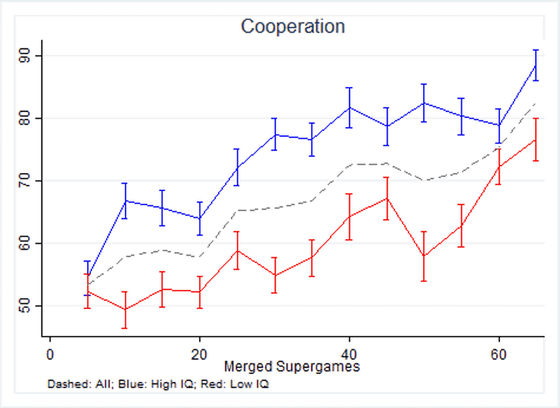"Wise people are more cooperative and will have a positive impact on society as a whole"?

Ancient Greek philosopherAristotle"Humans arePoliceAs we have been advocating, "human beings are social communities, and it has been pointed out since ancient times that they exist constantly on relationships with others. And the research result that social cooperation is worse as a smart human being has a good influence on the community to which it belongs,ConversationIt is introduced in.
How clever people help societies work together better
https://theconversation.com/how-clever-people-help-societies-work-together-better-93463
INTELLIGENCE, PERSONALITY AND GAINS FROM COOPERATION IN REPEATED INTERACTIONS
(PDF file)https://docs.google.com/viewer?a=v&pid=sites&srcid=ZGVmYXVsdGRvbWFpbnxhbmRpc3NvZmlhbm9zfGd4OjcxYWMwN2ExNzMwOGQ1YWE
People are social animals that help each other in various situations. Many economists have argued that "worrying about others and social position" creates cooperative actions to sustain society. On the other hand, there are also people claiming that "defending the rules and respecting the community" leads to socially useful behavior. In addition, some economists have said that "pursuing their own interests with intelligence" is necessary for becoming a member of society.
there,Behavioral economicsBe a personEugenio ProtoIn order to investigate "Why do people cooperate with each other", they did an experiment for 792 people. The subjects were asked to take a questionnaire beforehand and investigated "social attitude", "compliance with rules" and "intelligence" respectively. Then, each group is divided into two groups,Prisoner's dilemmaWe played a game called.
In the prisoner's dilemma, we assume the situation that a prosecutor places the following judicial deal in order to confess two prisoners who jointly believed to have committed a crime.
1.If two people "cooperate" and remain silent, both will be sentenced to two years in prison.
2.Even if one person "cooperates" and is silent, if another person chooses "betrayal" and confesses, the prisoner who confessed is released but the person who kept silent is sentenced to 10 years in prison.
3.If both of them choose "betrayal" and confess, both will be sentenced to five years in prison
The important point of the prisoner's dilemma is that even if both of them choose "cooperation", despite the light punishment of punishment, if they pursue only their own interests, they will choose "betrayal", so the result The point is that punishment becomes heavier.
In order to investigate the question as to whether it is possible for the research team to cooperate with others while pursuing their own interests, the part which corresponds to "release and imprisonment" in the prisoner's dilemma is replaced with monetary reward, while combining with various players He said he had repeatedly played games.
The graph below shows the proportion in which the vertical axis cooperates, the horizontal axis is the number of times the game is repeated, the blue line cooperates with people with higher intelligence quotient (IQ) than constant, the red line shows the low IQ It shows the cooperative proportion of people. As you can see, people with higher intelligence generally have a higher percentage of cooperation. In addition, although the proportion of cooperating with less frequent cases is not so high, the proportion of cooperating more as the game is repeated many times is high. From this fact, it turns out that "people with high intelligence are not cooperative in nature, but as a result of learning and processing information faster, they become more coordinated". On the other hand, when I looked at "social position" and "rule compliance", I did not see any difference in cooperation ratio.

Furthermore, it turned out that people with high intelligence can lead others by using the advantage of cognition. The graph below shows the result of doing grouping according to personality rather than intelligence and playing a game among them. As you repeat the game with someone with high intelligence, you can see that the proportion of cooperation of red lines is also high.

Based on this result, the research team concludes that "a few wise people will benefit others in the same group or workplace". Moreover, from the research results that people with high intelligence exerts a good influence on the surroundings and gives benefits to the entire community, he argues that "education from young children is important not only for individuals but also for society as a whole" did.
Related Posts:
in Note, Posted by log1i_yk







